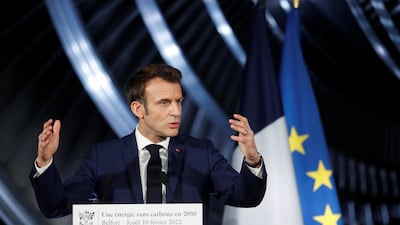French President Emmanuel Macron has unveiled an ambitious nuclear power plant programme through which the country will build six new nuclear reactors to achieve its climate change targets.
Mr Macron made the pledge as he visited a turbine manufacturing site in the town of Belfort in eastern France during a pre-election tour.
The power plants will be built by state-controlled energy giant EDF by 2050 and tens of billions of euros will be mobilised to finance the construction projects.
“What our country needs, and the conditions are there, is the rebirth of France's nuclear industry,” Mr Macron said.
Low-cost nuclear power has been a mainstay of the French economy since the 1970s, but recent attempts to build new-generation reactors to replace older models have become mired in cost overruns and delays.
Promising to accelerate the development of solar and offshore wind power in France, Mr Macron also announced he wanted to extend the lifespan of older nuclear plants to 50 years or more from 40 years currently, provided it was safe.
EDF estimates the cost of six new EPR reactors at about €50 billion, depending on financing conditions.
The first new reactor, an evolution of the European Pressurised Reactor (EPR), would come online by 2035, Mr Macron said. Studies for a further eight reactors beyond the initial half-dozen new plants would be launched, he added.
France will also increase its solar power capacity tenfold by 2050 to more than 100 gigawatts and focus on building 50 offshore wind farms with a combined capacity of at least 40 gigawatts. Capacity from land-based wind turbines, which face strong public resistance, would only be doubled by 2050, he said.
Mr Macron's decision to extend the lifespan of existing plants marked an about-turn on an earlier pledge to close more than a dozen of EDF's 56 reactors by 2035.

The French government successfully lobbied to have nuclear power labelled as “green” by the European Commission this month in a major energy review, which means it can attract funding as a climate-friendly power source.
Mr Macron has consistently said that nuclear energy was required to help advanced economies' transition to a low-carbon future and meet their climate target goals.
Germany decided to phase out nuclear industry by the end of 2022 following the 2011 Fukushima disaster, but the decision has been criticised for increasing Berlin's reliance on carbon-emitting gas and raising power prices.
The new French programme comes as the heavily indebted EDF faces difficulties in trying to build its latest-generation EPR reactors in separate projects in France, Britain and Finland.
Its flagship French project in Flamanville in northern France is expected to cost about four times the initial budget of €3.3 billion and will not be loaded with fuel until next year at the earliest.
The site was sold by French industrial company Alstom to US rival General Electric in 2015 in a widely criticised deal associated with Mr Macron, who was the economy minister in the Socialist government at the time.
The divestment led to more than a thousand job cuts and fears over the loss of a strategic industry to a foreign investor.
Under pressure from the French government, EDF announced on Thursday that it had agreed to a deal to buy back the unit at a cost of €175m.


